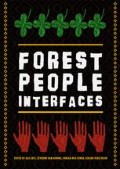Abstract
This chapter uses the discourse concept and theory to explore discourses of community forestry. The concept of community forestry (CF) was introduced by the UN Food and Agriculture Organization (FAO) in the 1970s and promoted by them since then. Three major shifts in CF discourses are described: the forest resource scarcity CF discourse, the tropical forest conservation CF discourse and the community enterprise CF discourse, leaving the question unanswered whether they should be considered as distinctive discourses, or rather as one discourse with different key elements. These three are the most prominent manifestations of the CF discourse, but other more specific discourses could also be identified as CF discourses or modifications of the CF discourse, such as the forest common property discourse and the adaptive forest management discourse. I analyse each of the three CF discourses, reviewing their main arguments, their main protagonists and their public manifestations. The chapter also reviews wider societal trends and how they link to the shifts in CF discourses. The forest resource scarcity CF discourse emerged shortly after the beginning of the international concern about whether the world’s limited natural resources will be sufficient to meet future economic growth and related consumption. The tropical forest conservation CF discourse appears to have been a result of international concern about tropical deforestation, which has dominated international environmental agendas since the 1980s. Finally, the community enterprise CF discourse appears closely linked to a worldwide shift towards neoliberal economic policies, a reduction in the role of government in non-public affairs and a focus on poverty reduction in international development assistance. The three examples suggest a close relation between CF discourses and practice and other wider societal environmental and economic concerns and discussions. Given the emerging concern about climate change issues, it can be predicted that a future CF discourse will likely incorporate climate change mitigation elements.
Access this chapter
Tax calculation will be finalised at checkout
Purchases are for personal use only
References
AIDESEP (2011). Construyendo REDD Indigena. Available at: http://www.forestpeoples.org/.
Angelsen, A. and Kaimowitz, D. (1999). Rethinking the causes of deforestation: lessons from economic models. The World Bank Research Observer 14(1): 73–98.
Arnold, M. (1991). Community forestry: ten years in review. Food and Agriculture Organization, Rome, Italy.
Arts, B. and Buizer, M. (2009). Forests, discourses, institutions. A discursive-institutional analysis of global forest governance. Forest Policy and Economics 11: 340–347.
Arts, B., Appelstrand, M., Eba’a Atyi, R., Enters, T., Hamakers, I., Kleinschmit, D., Pulzl, H., Visseren-McGinley K. and Yasmi, Y. (2010). Discourses, actors and instruments in international forest governance. Embracing complexity - meeting the challenges of international forest governance. IUFRO World Series 28, pp. 57–73. Available at: http://www.iufro.org/science/gfep/forest-regime-panel/report/.
Eckholm, E. (1975). The other energy crisis: firewood. Worldwatch Paper 1, Worldwatch Institute, Washington, DC, USA.
De Jong, W. (2010). Forest rehabilitation and its implication for forestry transition theory. Biotropica 42(1): 3–9.
De Jong, W. and Ruiz, S. (2011). Strangers among trees: policies and politics for foreign residents in northern Bolivian forests. Forest Policies and Economics, in press. DOI: http:/dx.doi.org/10.1016/j.forpol.2011.02.004.
De Jong, W., Louman, L., Pokorny, B., Sabogal, C., and Stoian, D. (2008). Antecedentes, realidad y oportunidades del manejo forestal comunitario en América Latina. In: Sabogal, C., De Jong, W., Lauman, B. and Pokorny, B. (eds.) El manejo forestal comunitario en America Latina: experiencias, lecciones aprendidas y retos para el futuro. CIFOR, CATIE, Belem, Brazil, pp. 33–74.
Eckholm, E. (1975). The other wood energy crisis, firewood. Worldwatch Institute, Washington, DC, USA.
Elands, B. and Wiersum, F. (2001). Forestry and rural development in Europe: an exploration of socio-political discourses. Forest Policy and Economics 3(1/2): 5–16.
Food and Agriculture Organization (FAO). (1978). Forestry for local community development. Forestry Paper 7, FAO, Rome, Italy.
Hajer, M. and Versteeg, W. (2005). A decade of discourse analysis of environmental politics: achievements, challenges, perspectives. Journal of Environmental Policy and Planning 7(3): 175–184.
Hickey, S. and Mohan, G. (2004). Participation: from tyranny to transformation? Exploring new approaches to participation in development. Zed Books, London, UK.
Kleinschmit, D. (2011). Confronting the demands of a deliberative public sphere with media constraints. Forest Policy and Economics, in press. DOI: http://dx.doi.org/10.1016/j.forpol.2010.02.013.
McDermott, M. and Schreckenberg, K. (2009). Equity in community forestry: insights from North and South. International Forestry Review 11(2): 57–170.
Pacheco, P., De Jong, W. and Johnson, J. (2010). The evolution of the timber sector in lowland Bolivia: Examining the influence of three disparate policy approaches. Forest Policy and Economics 12: 271–276.
Peters, C.M., Gentry, A.H. and Mendelsohn, R.O. (1989). Valuation of an Amazonian rainforest. Nature 339: 655–656.
Pokorny, B., De Jong, W., Louman, B., Pacheco, P., Porro, N., Sabogal, C. and Stoian, D. (2008). Experiencias y retos del manejo forestal comunitario en America Latina. Recursos Naturales y Ambiente 54: 81–98.
Richardson, T. and Sharp, L. (2001). Reflections on Foucauldian discourse analysis in planning and environmental policy research. Journal of Environmental Policy and Planning 3: 193–209.
Sabogal, C., De Jong, W., Pokorny, B. and Lauman, B. (eds.) ( 2008). El manejo forestal comunitario en America Latina: experiencias, lecciones aprendidas y retos para el futuro. CIFOR, CATIE, Belem, Brazil.
Winkel, G. (2011). Foucault in the forests: a review of the use of ‘Foucauldian’ concepts in forest policy analysis. Forest Policy and Economics, in press. DOI: http://dx.doi.org/10.1016/j.forpol.2010.11.009.
Author information
Authors and Affiliations
Corresponding author
Editor information
Rights and permissions
Copyright information
© 2012 Wageningen Academic Publishers
About this chapter
Cite this chapter
de Jong, W. (2012). Discourses of community forestry. In: Arts, B., van Bommel, S., Ros-Tonen, M., Verschoor, G. (eds) Forest-people interfaces. Wageningen Academic Publishers, Wageningen. https://doi.org/10.3920/978-90-8686-749-3_6
Download citation
DOI: https://doi.org/10.3920/978-90-8686-749-3_6
Publisher Name: Wageningen Academic Publishers, Wageningen
Online ISBN: 978-90-8686-749-3
eBook Packages: Biomedical and Life SciencesBiomedical and Life Sciences (R0)


